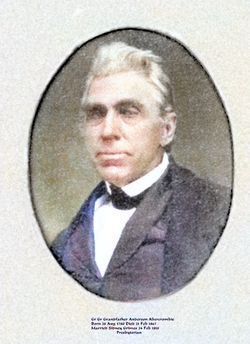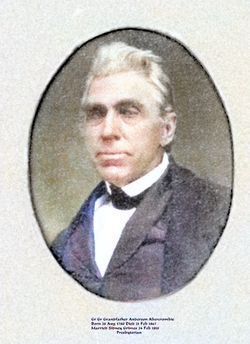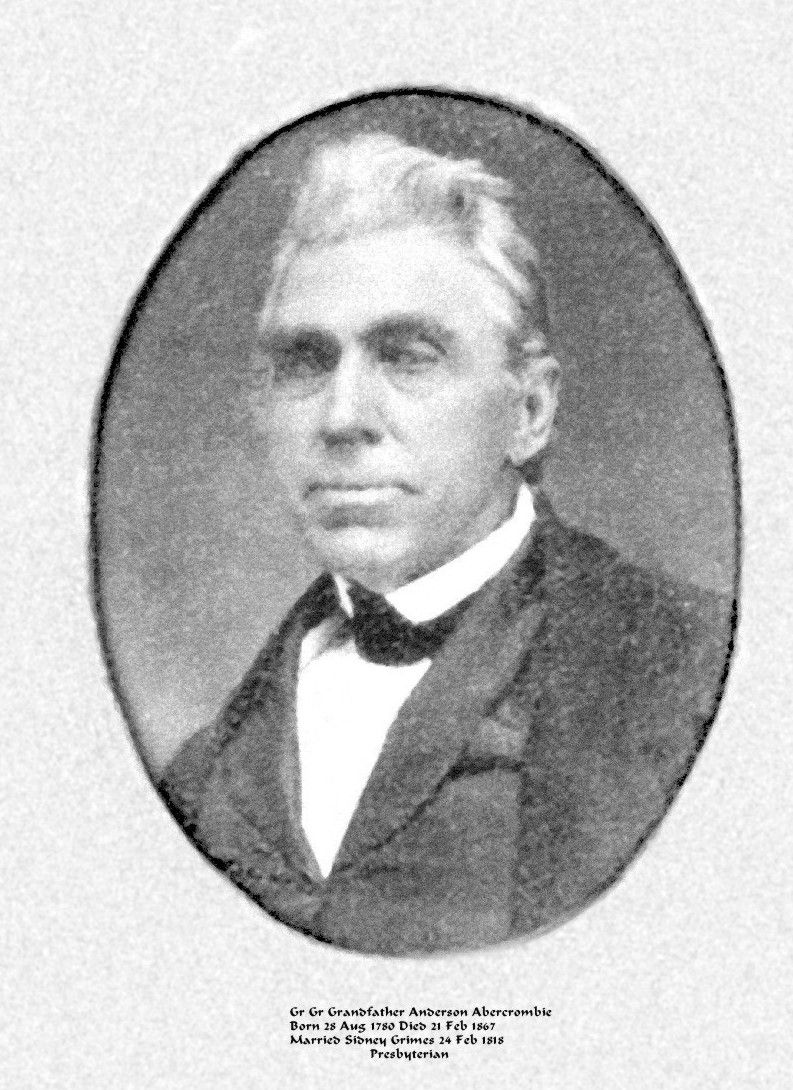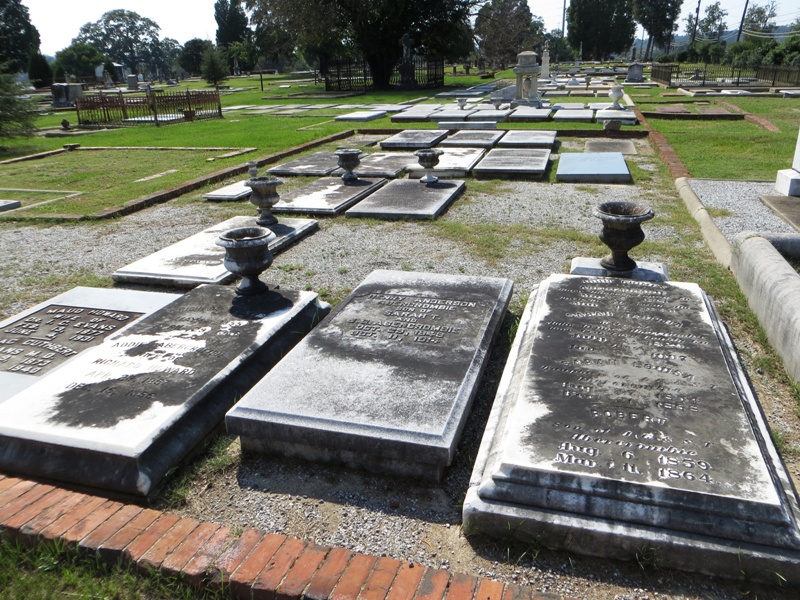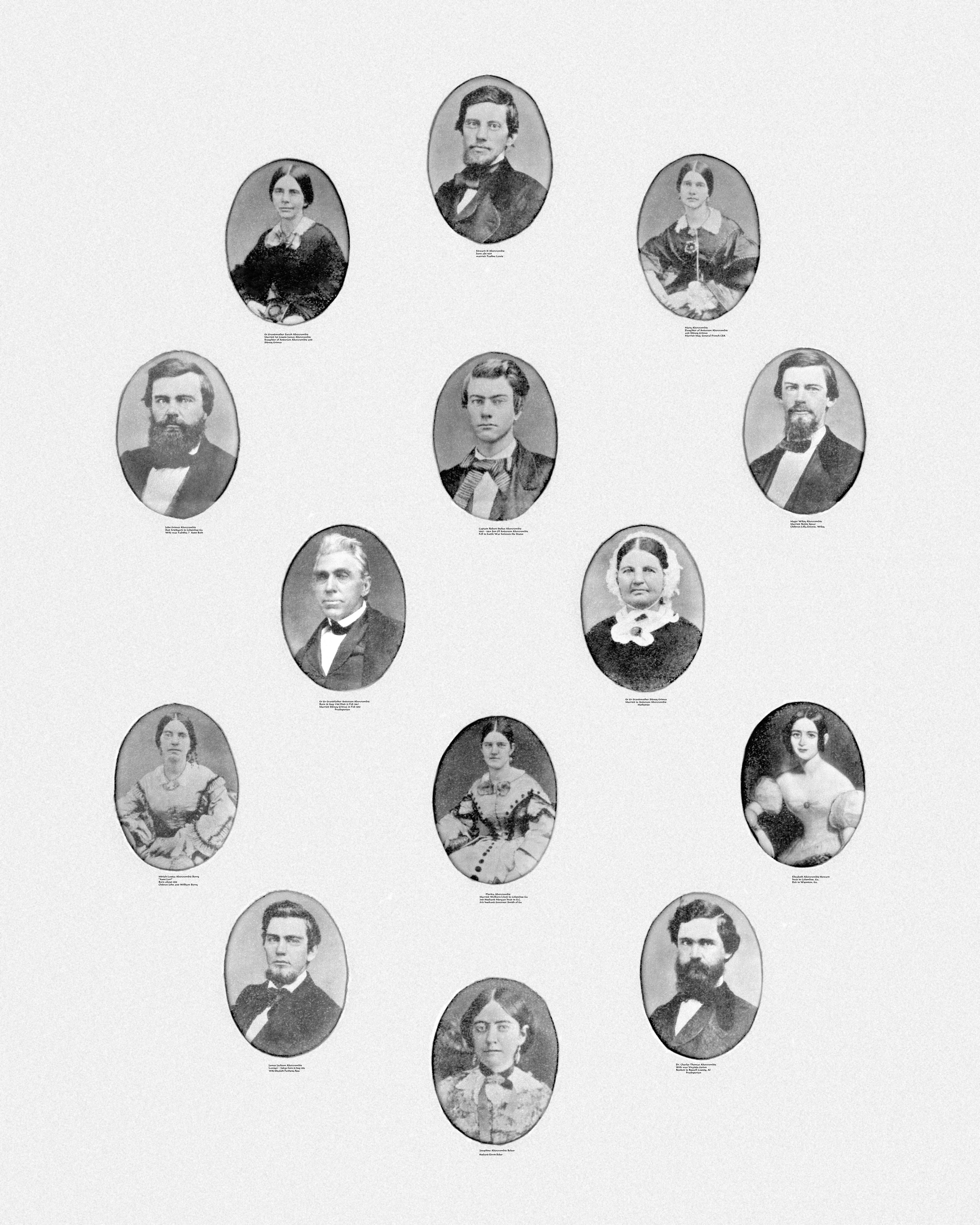By reference to county records at Seale, the name of Anderson Abercrombie is listed as foreman of the first Grand Jury ever enpaneled in a Russell County Circuit Court in 1833. Since that date his name appears on the jury list every year, up to a short time before his death. He was a general, commanding cavalry brigade, under Gen. Floyd in the War of 1812. He was in the battle of Ottosee and Calleebee, and was wounded in the left arm in the battle of Calleebee by a rifleshot. He was also in the service in the War of 1836. He was the first president of the Mobile and Girard Railroad, which office he resigned on account of his duties encroaching upon the time required in the management of a large and increasing farming interest, at which period had reached a capacity of 350 bales of cotton, 12,000 bushels of corn annually, besides 300 sheep, 250 goats and 700 hogs. The income from such a plantation was considered princely in those days.
General Abercrombie served two terms in the Georgia Legislature from Hancock County, before he emigrated to Alabama. In this state he was frequently offered political promotion but positively declined, holding that there was more honor in obeying the laws than in making them. He devoted himself entirely to his farming interests and the local claim of his neighborhood in the private social walks of life.
After his father's death, General Abercrombie was appointed administrator on the estate, which was an unusually large one for the times and required more than ordinary business capacity to bring to a speedy, successful and satisfactory close, involving nice and obscure points of law.
This brought him in close business contact with the best legal talent of the Georgia bar, which acquired for him a familiar knowledge with the legal profession seldom professed by a private citizen. So when he came to Alabama, he soon ranked as the best jurist in private life in the county if not in the state, and was honored and respected. The venerable Judge. G. D. Hooper, of Opelika who in his prime was a contemporary and a warm friend of General Abercrombie, regarded him as a man for whom nature had done more and education less, than any man in Ru-ssell County and the County recognized thie fact, regarding him as the only peer of ex-Governor Hamilton, of South Carolina, who settled on the Oswichie Bend in 1842, and afterwards moved to Texas and died.
General Abercrombie died suddenly while on a visit to his daughter, February 21,1867, aged 82 years, and was laid in the family burying ground at the old homestead in Russell County, where his faithful companion of more than fifty years followed him in 1876. [CHECK]I am permitted to add the following testimony written by Gen. Robert Toombs, of Georgia, to one of his sons: "I never had a better friend than General Anderson Abercrombie, than whom God never made a truer, braver or better man."
Mrs. Elizabeth Howard, wife of the late N. Howard of Wynnton Ga.; John G Abercrombie, Still living (at the time of this writting) on part of the old estate; Mrs Sarah Abercrombie, wife of James Abercrombie Jr., late of Pensacola Florida; Dr. Charles T Abercrombie, who died on a portion of the old estate a few years ago; Judge J.J. Abercrombie of Opelika, Edward H. Abercrombie of Russell County; Mrs. Josephine Belser, and Mrs. Louvisa Berry, of Orlando, Florida; Robert Abercrombie, Adju+@-ant General of Cavalry, was killed in battle at Greensport, on the Alabama and Tennessee line, during the war; Mrs. Mary French, wife of Major General French of the Confederate Army, now in Wynnton, Ga,; Mrs. Florida Smith, wife of ex-Governor Smith of Georgia, now of Columbus; and Major Wiley Abercrombie, of Orlando, Florida, are his children. Five of these brothers and two brothers-in-law did noble service in the late war, and, as stated above, one brother was killed in battle. This is a good record for one generation of children.
The Abercrombies were said to be as quiet as lambs in peace and safety, and bold as lions in war and danger. They were a wealthy family and gathered around them the most intelligent and refined Society in the State, dispensing a hospitality, bounded only by good taste and sound judgement, consequently it was as durable as their lives were long. Their social position was the highest and in the latter years of their lives was tempered to a still higher refinement by the potent influences of the Christian religion. The family connexion of today is the most extensive in Russell, Lee and Macon counties. By blood and by Marriage they are connected with the Bellamys, Crowells, Nesbits, Lindseys, Lewises, Martins, Grants Claytons, Clantons, Belsers, Halls, Rosses, Slenus, Gordons, Fraders, Hurts, Davies, McDonalds, etc.
In the olden days, gala days were frequent on the Bend, "Abercrombie Bar" being the favorite picnic ground. It was when the great oaks put on their autumn livery of crimson and gold just after the hoar frost glittered upon the distant terraced hills, and the proverbial Southern Indian summer was in its glory, when the partridge answered its mate in the russet meadord, when the black birds whistled in the hazel copprice and the wild turkeys were piping in the deep woods and the hurry and flurry of the crop season was over and general relaxation for man and beast followed, that the youthful manhood and maiden beauty, the reigning belles and beaux, both rustic and refined, from city and country on both sides of the river would gather in hundreds at this favorite resort to enjoy a day of recreation and indulge in sports, amusements and pastimes of the old, old days.
It was before the hill country was reclaimed from the forest, and the channel of the river was not fiIled up. The water was deep and clear as crystal. Fish of all fresh water varieties and sizes were abundant. The tall meadow beneath the wide spreading magnolias was green nearly all the year round. It was under the one and over the other that the long table was extended many yards and loaded with fish from a hundred baskets, game from a hundred bags and pastry from cuisine for ten miles up and down the river on both sides. And th amusements and the pastimes were as varied as the tastes of the participants,, boat racing, canoe rowing, fishing matches - in which other game than the finney tribe was angled for - duck shooting, leap frog, indian ball playing, and deer hunting, all these and many other manly sports were enjoyed with unstinted zest, while hundreds of Indians would join in the sports congenial to their tastes, ever anon and exclaiming "Ugh! Pale face love fun heap, big much!".
Many now living remember with a glow of pleasure these reunions of the days of their early life, a life which was then tinted with all the colors of the rose. But the "silver gray" is now mingling with all the hues of the morning life; yet, the gala days at Abercrombie's bar, on Coweta Bend, is an oft perused passage on memory's fast fading page.
By reference to county records at Seale, the name of Anderson Abercrombie is listed as foreman of the first Grand Jury ever enpaneled in a Russell County Circuit Court in 1833. Since that date his name appears on the jury list every year, up to a short time before his death. He was a general, commanding cavalry brigade, under Gen. Floyd in the War of 1812. He was in the battle of Ottosee and Calleebee, and was wounded in the left arm in the battle of Calleebee by a rifleshot. He was also in the service in the War of 1836. He was the first president of the Mobile and Girard Railroad, which office he resigned on account of his duties encroaching upon the time required in the management of a large and increasing farming interest, at which period had reached a capacity of 350 bales of cotton, 12,000 bushels of corn annually, besides 300 sheep, 250 goats and 700 hogs. The income from such a plantation was considered princely in those days.
General Abercrombie served two terms in the Georgia Legislature from Hancock County, before he emigrated to Alabama. In this state he was frequently offered political promotion but positively declined, holding that there was more honor in obeying the laws than in making them. He devoted himself entirely to his farming interests and the local claim of his neighborhood in the private social walks of life.
After his father's death, General Abercrombie was appointed administrator on the estate, which was an unusually large one for the times and required more than ordinary business capacity to bring to a speedy, successful and satisfactory close, involving nice and obscure points of law.
This brought him in close business contact with the best legal talent of the Georgia bar, which acquired for him a familiar knowledge with the legal profession seldom professed by a private citizen. So when he came to Alabama, he soon ranked as the best jurist in private life in the county if not in the state, and was honored and respected. The venerable Judge. G. D. Hooper, of Opelika who in his prime was a contemporary and a warm friend of General Abercrombie, regarded him as a man for whom nature had done more and education less, than any man in Ru-ssell County and the County recognized thie fact, regarding him as the only peer of ex-Governor Hamilton, of South Carolina, who settled on the Oswichie Bend in 1842, and afterwards moved to Texas and died.
General Abercrombie died suddenly while on a visit to his daughter, February 21,1867, aged 82 years, and was laid in the family burying ground at the old homestead in Russell County, where his faithful companion of more than fifty years followed him in 1876. [CHECK]I am permitted to add the following testimony written by Gen. Robert Toombs, of Georgia, to one of his sons: "I never had a better friend than General Anderson Abercrombie, than whom God never made a truer, braver or better man."
Mrs. Elizabeth Howard, wife of the late N. Howard of Wynnton Ga.; John G Abercrombie, Still living (at the time of this writting) on part of the old estate; Mrs Sarah Abercrombie, wife of James Abercrombie Jr., late of Pensacola Florida; Dr. Charles T Abercrombie, who died on a portion of the old estate a few years ago; Judge J.J. Abercrombie of Opelika, Edward H. Abercrombie of Russell County; Mrs. Josephine Belser, and Mrs. Louvisa Berry, of Orlando, Florida; Robert Abercrombie, Adju+@-ant General of Cavalry, was killed in battle at Greensport, on the Alabama and Tennessee line, during the war; Mrs. Mary French, wife of Major General French of the Confederate Army, now in Wynnton, Ga,; Mrs. Florida Smith, wife of ex-Governor Smith of Georgia, now of Columbus; and Major Wiley Abercrombie, of Orlando, Florida, are his children. Five of these brothers and two brothers-in-law did noble service in the late war, and, as stated above, one brother was killed in battle. This is a good record for one generation of children.
The Abercrombies were said to be as quiet as lambs in peace and safety, and bold as lions in war and danger. They were a wealthy family and gathered around them the most intelligent and refined Society in the State, dispensing a hospitality, bounded only by good taste and sound judgement, consequently it was as durable as their lives were long. Their social position was the highest and in the latter years of their lives was tempered to a still higher refinement by the potent influences of the Christian religion. The family connexion of today is the most extensive in Russell, Lee and Macon counties. By blood and by Marriage they are connected with the Bellamys, Crowells, Nesbits, Lindseys, Lewises, Martins, Grants Claytons, Clantons, Belsers, Halls, Rosses, Slenus, Gordons, Fraders, Hurts, Davies, McDonalds, etc.
In the olden days, gala days were frequent on the Bend, "Abercrombie Bar" being the favorite picnic ground. It was when the great oaks put on their autumn livery of crimson and gold just after the hoar frost glittered upon the distant terraced hills, and the proverbial Southern Indian summer was in its glory, when the partridge answered its mate in the russet meadord, when the black birds whistled in the hazel copprice and the wild turkeys were piping in the deep woods and the hurry and flurry of the crop season was over and general relaxation for man and beast followed, that the youthful manhood and maiden beauty, the reigning belles and beaux, both rustic and refined, from city and country on both sides of the river would gather in hundreds at this favorite resort to enjoy a day of recreation and indulge in sports, amusements and pastimes of the old, old days.
It was before the hill country was reclaimed from the forest, and the channel of the river was not fiIled up. The water was deep and clear as crystal. Fish of all fresh water varieties and sizes were abundant. The tall meadow beneath the wide spreading magnolias was green nearly all the year round. It was under the one and over the other that the long table was extended many yards and loaded with fish from a hundred baskets, game from a hundred bags and pastry from cuisine for ten miles up and down the river on both sides. And th amusements and the pastimes were as varied as the tastes of the participants,, boat racing, canoe rowing, fishing matches - in which other game than the finney tribe was angled for - duck shooting, leap frog, indian ball playing, and deer hunting, all these and many other manly sports were enjoyed with unstinted zest, while hundreds of Indians would join in the sports congenial to their tastes, ever anon and exclaiming "Ugh! Pale face love fun heap, big much!".
Many now living remember with a glow of pleasure these reunions of the days of their early life, a life which was then tinted with all the colors of the rose. But the "silver gray" is now mingling with all the hues of the morning life; yet, the gala days at Abercrombie's bar, on Coweta Bend, is an oft perused passage on memory's fast fading page.
Family Members
-
![]()
Elizabeth Abercrombie Howard
1819–1892
-
![]()
John Grimes Abercrombie
1821–1884
-
Charles Thomas Abercrombie
1824–1873
-
![]()
Sarah "Sallie" Abercrombie Abercrombie
1824–1882
-
![]()
Everard Hamilton Abercrombie
1827–1902
-
![]()
Mary Fontaine Abercrombie French
1837–1900
-
![]()
Florida Abercrombie Smith
1840–1925
-
![]()
1LT Wiley A. Abercrombie
1842–1930
Advertisement
Records on Ancestry
Advertisement
